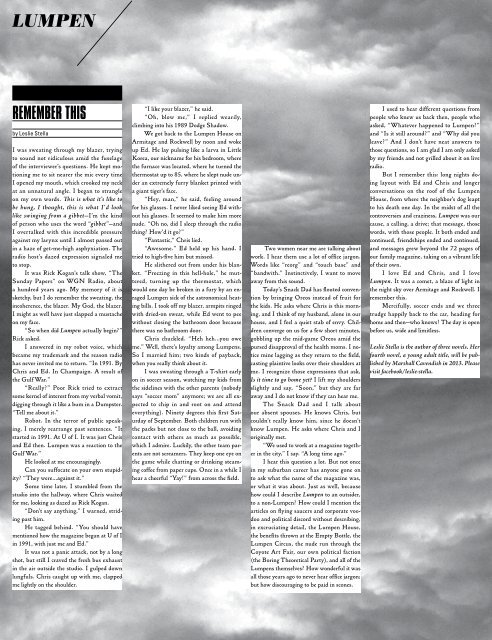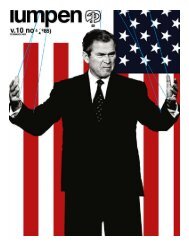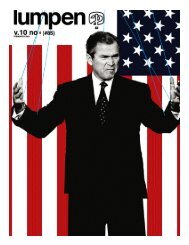{20th Anniversary Edition} CON - Lumpen
{20th Anniversary Edition} CON - Lumpen
{20th Anniversary Edition} CON - Lumpen
Create successful ePaper yourself
Turn your PDF publications into a flip-book with our unique Google optimized e-Paper software.
LUMPEN<br />
REmEmBER THIs<br />
by Leslie Stella<br />
I was sweating through my blazer, trying<br />
to sound not ridiculous amid the fuselage<br />
of the interviewer’s questions. He kept motioning<br />
me to sit nearer the mic every time<br />
I opened my mouth, which crooked my neck<br />
at an unnatural angle. I began to strangle<br />
on my own words. This is what it’s like to<br />
be hung, I thought, this is what I’d look<br />
like swinging from a gibbet—I’m the kind<br />
of person who uses the word “gibbet”—and<br />
I overtalked with this incredible pressure<br />
against my larynx until I almost passed out<br />
in a haze of get-me-high asphyxiation. The<br />
radio host’s dazed expression signaled me<br />
to stop.<br />
It was Rick Kogan’s talk show, “The<br />
Sunday Papers” on WGN Radio, about<br />
a hundred years ago. My memory of it is<br />
sketchy, but I do remember the sweating, the<br />
incoherence, the blazer. My God, the blazer.<br />
I might as well have just slapped a mustache<br />
on my face.<br />
“So when did <strong>Lumpen</strong> actually begin?”<br />
Rick asked.<br />
I answered in my robot voice, which<br />
became my trademark and the reason radio<br />
has never invited me to return. “In 1991. By<br />
Chris and Ed. In Champaign. A result of<br />
the Gulf War.”<br />
“Really?” Poor Rick tried to extract<br />
some kernel of interest from my verbal vomit,<br />
digging through it like a bum in a Dumpster.<br />
“Tell me about it.”<br />
Robot. In the terror of public speaking,<br />
I merely rearrange past sentences. “It<br />
started in 1991. At U of I. It was just Chris<br />
and Ed then. <strong>Lumpen</strong> was a reaction to the<br />
Gulf War.”<br />
He looked at me encouragingly.<br />
Can you suffocate on your own stupidity?<br />
“They were…against it.”<br />
Some time later, I stumbled from the<br />
studio into the hallway, where Chris waited<br />
for me, looking as dazed as Rick Kogan.<br />
“Don’t say anything,” I warned, striding<br />
past him.<br />
He tagged behind. “You should have<br />
mentioned how the magazine began at U of I<br />
in 1991, with just me and Ed.”<br />
It was not a panic attack, not by a long<br />
shot, but still I craved the fresh bus exhaust<br />
in the air outside the studio. I gulped down<br />
lungfuls. Chris caught up with me, clapped<br />
me lightly on the shoulder.<br />
“I like your blazer,” he said.<br />
“Oh, blow me,” I replied wearily,<br />
climbing into his 1989 Dodge Shadow.<br />
We got back to the <strong>Lumpen</strong> House on<br />
Armitage and Rockwell by noon and woke<br />
up Ed. He lay pulsing like a larva in Little<br />
Korea, our nickname for his bedroom, where<br />
the furnace was located, where he turned the<br />
thermostat up to 85, where he slept nude under<br />
an extremely furry blanket printed with<br />
a giant tiger’s face.<br />
“Hey, man,” he said, feeling around<br />
for his glasses. I never liked seeing Ed without<br />
his glasses. It seemed to make him more<br />
nude. “Oh no, did I sleep through the radio<br />
thing? How’d it go?”<br />
“Fantastic,” Chris lied.<br />
“Awesome.” Ed held up his hand. I<br />
tried to high-five him but missed.<br />
He slithered out from under his blanket.<br />
“Freezing in this hell-hole,” he muttered,<br />
turning up the thermostat, which<br />
would one day be broken in a fury by an enraged<br />
<strong>Lumpen</strong> sick of the astronomical heating<br />
bills. I took off my blazer, armpits ringed<br />
with dried-on sweat, while Ed went to pee<br />
without closing the bathroom door because<br />
there was no bathroom door.<br />
Chris chuckled. “Heh heh…you owe<br />
me.” Well, there’s loyalty among <strong>Lumpen</strong>s.<br />
So I married him; two kinds of payback,<br />
when you really think about it.<br />
I was sweating through a T-shirt early<br />
on in soccer season, watching my kids from<br />
the sidelines with the other parents (nobody<br />
says “soccer mom” anymore; we are all expected<br />
to chip in and root on and attend<br />
everything). Ninety degrees this first Saturday<br />
of September. Both children run with<br />
the packs but not close to the ball, avoiding<br />
contact with others as much as possible,<br />
which I admire. Luckily, the other team parents<br />
are not screamers. They keep one eye on<br />
the game while chatting or drinking steaming<br />
coffee from paper cups. Once in a while I<br />
hear a cheerful “Yay!” from across the field.<br />
Two women near me are talking about<br />
work. I hear them use a lot of office jargon.<br />
Words like “reorg” and “touch base” and<br />
“bandwith.” Instinctively, I want to move<br />
away from this sound.<br />
Today’s Snack Dad has flouted convention<br />
by bringing Oreos instead of fruit for<br />
the kids. He asks where Chris is this morning,<br />
and I think of my husband, alone in our<br />
house, and I feel a quiet stab of envy. Children<br />
converge on us for a few short minutes,<br />
gobbling up the mid-game Oreos amid the<br />
pursed disapproval of the health moms. I notice<br />
mine lagging as they return to the field,<br />
casting plaintive looks over their shoulders at<br />
me. I recognize those expressions that ask,<br />
Is it time to go home yet? I lift my shoulders<br />
slightly and say, “Soon,” but they are far<br />
away and I do not know if they can hear me.<br />
The Snack Dad and I talk about<br />
our absent spouses. He knows Chris, but<br />
couldn’t really know him, since he doesn’t<br />
know <strong>Lumpen</strong>. He asks where Chris and I<br />
originally met.<br />
“We used to work at a magazine together<br />
in the city,” I say. “A long time ago.”<br />
I hear this question a lot. But not once<br />
in my suburban career has anyone gone on<br />
to ask what the name of the magazine was,<br />
or what it was about. Just as well, because<br />
how could I describe <strong>Lumpen</strong> to an outsider,<br />
to a non-<strong>Lumpen</strong>? How could I mention the<br />
articles on flying saucers and corporate voodoo<br />
and political discord without describing,<br />
in excruciating detail, the <strong>Lumpen</strong> House,<br />
the benefits thrown at the Empty Bottle, the<br />
<strong>Lumpen</strong> Circus, the nude run through the<br />
Coyote Art Fair, our own political faction<br />
(the Boring Theoretical Party), and all of the<br />
<strong>Lumpen</strong>s themselves? How wonderful it was<br />
all those years ago to never hear office jargon;<br />
but how discouraging to be paid in scones.<br />
I used to hear different questions from<br />
people who knew us back then, people who<br />
asked, “Whatever happened to <strong>Lumpen</strong>?”<br />
and “Is it still around?” and “Why did you<br />
leave?” And I don’t have neat answers to<br />
those questions, so I am glad I am only asked<br />
by my friends and not grilled about it on live<br />
radio.<br />
But I remember this: long nights doing<br />
layout with Ed and Chris and longer<br />
conversations on the roof of the <strong>Lumpen</strong><br />
House, from where the neighbor’s dog leapt<br />
to his death one day. In the midst of all the<br />
controversies and craziness, <strong>Lumpen</strong> was our<br />
cause, a calling, a drive; that message, those<br />
words, with those people. It both ended and<br />
continued, friendships ended and continued,<br />
and messages grew beyond the 72 pages of<br />
our family magazine, taking on a vibrant life<br />
of their own.<br />
I love Ed and Chris, and I love<br />
<strong>Lumpen</strong>. It was a comet, a blaze of light in<br />
the night sky over Armitage and Rockwell. I<br />
remember this.<br />
Mercifully, soccer ends and we three<br />
trudge happily back to the car, heading for<br />
home and then—who knows? The day is open<br />
before us, wide and limitless.<br />
Leslie Stella is the author of three novels. Her<br />
fourth novel, a young adult title, will be published<br />
by Marshall Cavendish in 2013. Please<br />
visit facebook/leslie-stella.<br />
BACK IN THE DAY<br />
by Steve Eckardt<br />
So, yeah, hats off to <strong>Lumpen</strong> for still being<br />
here 20 years on — and even more to you, a<br />
priceless reader no matter when you came<br />
in.<br />
Now settle round the fire, people,<br />
the esteemed editor wants a little about<br />
<strong>Lumpen</strong>’s early days. So here’s a story or two.<br />
THEm<br />
It’s been 17 years since I first walked into<br />
<strong>Lumpen</strong> HQ, just back from covering the<br />
Zapatista uprising in Mexico, me clutching<br />
photos of peasants machine-gunned by the<br />
federales –damning exposé shots photos no<br />
major publisher would run (except for one<br />
sweet spread in Paris Match).<br />
Me: I was doing periodic freelance journalism,<br />
drawn to the hot spots even as I was<br />
raising two little daughters and working as a<br />
CTA rail mechanic.<br />
Them – the <strong>Lumpen</strong> people—they were<br />
all over the place, HQ humming. Tats and<br />
weird hair, but no BO (ok, almost).<br />
Me already a little grizzled—and a stone<br />
Red—and them open-minded.<br />
But all of us with a determination to<br />
publish—in bloody print, mind you—to get<br />
stuff out. Truth for most of us. Art for some<br />
others.<br />
Of course some of the original<br />
crew are in suburbia now. This is what<br />
America does to rebel-minded people...<br />
though it’s also got the bullet for for the<br />
real revos (think Malcolm X, MLK,<br />
George Jackson, and Fred Hampton).<br />
ANCIENT TImEs<br />
So let’s go back almost twenty years,<br />
back to the old days, back when everything<br />
were so different. It was like this:<br />
Back then we’d just gotten rid of a President<br />
named Bush and had a supposedlypromising<br />
Democrat –called by many “the<br />
first Black president”– in office.<br />
Of course he set about doing shit Bush<br />
could never get away with like ending welfare<br />
and attacking social security. Plus launching<br />
a couple new wars: “sanctions” and a “no<br />
fly zone” against Iraq that killed more than<br />
400,000 Iraqis (most of them children) and<br />
bombing Yugoslavia –just to protect national<br />
security, bring freedom and save lives, mind<br />
you.<br />
Speculators who’d gamed the savingsand-loan<br />
banking system were given trillions<br />
of public money to cover their losses.<br />
4 5<br />
Credit collapses (then California’s Orange<br />
County municipal bonds) threatened<br />
the world financial system.<br />
The dispossessed toppled the old order<br />
in an oil-rich country (Mexico, then), standing<br />
firm despite being massacred,<br />
Republicans frothed, tied up Congress,<br />
and demanded massive tax-cuts and subsidies<br />
for the America’s wealthy job-creators<br />
– the “first Black president” capitulating to<br />
them, and driving through draconian cuts on<br />
poor and working people. (Hey, he was just<br />
looking out for the good of the country, it was<br />
out of money back then,)<br />
Nonetheless opposing the merciless record<br />
of the Dem who replaced Bush was considered<br />
aiding and abetting the Republican<br />
monsters.<br />
A speculative bubble had grown, and<br />
people were worried that a loan default or a<br />
bankruptcy might bring down the world financial<br />
system.<br />
Have-not countries were being squeezed<br />
by lenders to gut their social services and to<br />
surrender their resources to foreign privatizers.<br />
Yeah, that’s the way it was way back<br />
then, back in the day.<br />
Hard to imagine things being like that,<br />
right?<br />
Steve Eckardt is a CTA railcar mechanic.<br />
Archives of his writing—and much more—<br />
are at SeeingRed.com—though he says go to<br />
TheMilitant.com instead. Write to him at<br />
Seckardt@aol.com.<br />
WHO Is ADmIRAL PIP?<br />
by Admiral Pip<br />
During the <strong>Lumpen</strong> salad years of the mid-<br />
90s, it seemed as if everyone used a pseudonym.<br />
I was an intern at In These Times,<br />
trying to get my first article published. Jim<br />
McNeil was the managing editor at the<br />
time and several people involved with the<br />
Baffler were on staff. I tried my best but<br />
wasn’t much of a writer yet. I had just returned<br />
to Chicago after 4 years in Brazil<br />
teaching English and living in various ghettos<br />
on a couple hundred bucks a month.<br />
McNeil kept rejecting my articles, kindly<br />
pointing out that In These Times was basically<br />
an American news magazine. In rejecting<br />
one short piece about a multi-million<br />
dollar fraud he said, “doesn’t this kind of<br />
thing happen all the time down there?”<br />
When I finally managed to publish my first<br />
article, based on an email conversation with<br />
Linus Torvalds, copy editor George Hodak<br />
changed every single sentence. One morning<br />
I was sitting in the break room drinking<br />
coffee when Hodak wandered in. “I’ve<br />
been reading your stuff,” he said, “and<br />
I was thinking. Why don’t you send it to<br />
<strong>Lumpen</strong>. Ed Marsewski used to be an intern<br />
here too.”<br />
I had an old article lying around that<br />
I wrote when I was living in Brazil during<br />
the pre-email days about spending an afternoon<br />
drinking with the notorious train robber<br />
and ersatz Sex Pistols vocalist Ronald<br />
Biggs. Ed was wildly enthusiastic about it.<br />
I later learned that Ed is just a wildly enthusiastic<br />
guy in general but at the time it made<br />
me feel special. The enthusiasm was contagious.<br />
I quickly wrote an article about going<br />
out to the West Side with a friend who was<br />
scoring heroin. It was a spatial analysis of a<br />
large, nomadic street pharmacy with dozens<br />
of employees. Nobody at <strong>Lumpen</strong> was using<br />
their real name. There was Charmain<br />
Thar, Chairman Pharr, Molnar, Che Maraschino,<br />
Leslie Stella. I decided that I might<br />
as well join the crowd. I was in a bedroom<br />
space band called Edible Sea Worm, named<br />
after a kind of food gathered only by women<br />
during full moons in Indonesia. It made a<br />
nice name. After a few articles I shortened<br />
it to E.S. Worm. As the Easy Listening<br />
lifestyle began to take off I changed it to Ian<br />
Al-Sabbah, combining Ian Fleming with a<br />
15th Century hashish assassin. Throughout<br />
this period I would also occasionally submit<br />
things with no byline whatsoever. I believed<br />
in the <strong>Lumpen</strong> counter-hegemony project<br />
and liked being an anonymous contributor<br />
to the team. Sometimes I would use my real<br />
name. I would do this if it was something I<br />
was particularly proud of, like my article on<br />
Daley’s CTA cuts, or if it was something<br />
criticizing the CIA or FBI so as not to be<br />
accused of being a chicken.<br />
In 1999 I had a falling out with Ed. I<br />
disappeared to a city called São Luis on an<br />
island off of the coast of Northeastern Brazil<br />
where I tried to lead a normal life drinking<br />
and womanizing like the rest of the natives.<br />
In 2002 Liz Armstrong wrote me to say<br />
that she was taking over as <strong>Lumpen</strong> editor.<br />
She asked me to write something and suggested<br />
that I bury the hatchet with Ed. It<br />
was an offer I couldn’t refuse, mainly because<br />
of the compromising secret dossier that Liz<br />
had been guarding on me all along (“I’ll put<br />
your balls in a vice so fast it will make your<br />
head spin,” was the phrase that she used at<br />
the time). I was down on my luck and fed up<br />
with my life. Liz’s email was a godsend. I<br />
asked her for help creating a new penname. I<br />
wanted it to be something vaguely decadent,<br />
a gringo on the lam. I remembered the legendary<br />
1920s circus dwarf Admiral Pip and<br />
Liz added the title “Lord Sir”. She said,<br />
“you are such a weirdo you should just write<br />
about anything that you are doing at that<br />
moment,” and I was off.<br />
Having a good pseudonym gives you<br />
the flexibility of not having to always tell the<br />
truth. With a pseudonym you can exaggerate<br />
and get a better laugh without having to<br />
worry about being cross-examined by a bitter<br />
Oprah or a bloated Rosie O’Donnell about<br />
facts. Over the past 8 years, being Admiral<br />
Pip has brought me great joy. Despite not<br />
living there for years, I still miss Chicago<br />
like crazy and feel like every Pip article is a<br />
love letter to my hometown. Lately, however,<br />
something strange has happened. As my<br />
first and second marriages fell apart due to<br />
my own philandering and general naughty<br />
behavior, my inner sense of being began to<br />
fade as Pip began to occupy an ever larger<br />
section of my brain, my heart, my ego and<br />
my… As the years went by, longer and more<br />
detached from Chicago, I forgot how to<br />
speak English. The last time I was up there<br />
I was accused of being Croatian. For some<br />
reason, the nautical preppie look began to appeal<br />
to me. I began to shrink in stature and<br />
develop a penchant for wearing overcoats.<br />
My nose gradually shifted from bone to fur<br />
to plastic. I bought a boat and moved to Gloria<br />
Marina in Rio de Janeiro, running dope<br />
for the Italians with trained dolphin. I hired<br />
a team of Amazonian she-males for security<br />
purposes. I have learned how to play the<br />
Cuica and practice obscure rituals to weaken<br />
the spirits of my enemies. I drink my morning<br />
coffee from a human skull. I have become<br />
surly and mean tempered and I have turned<br />
into Admiral Pip!







